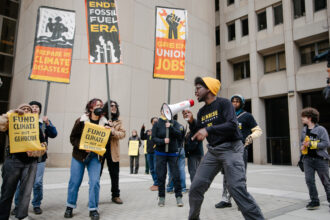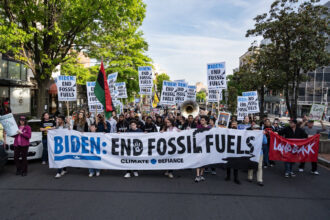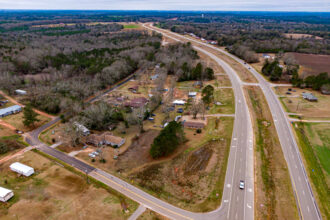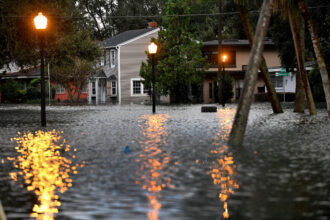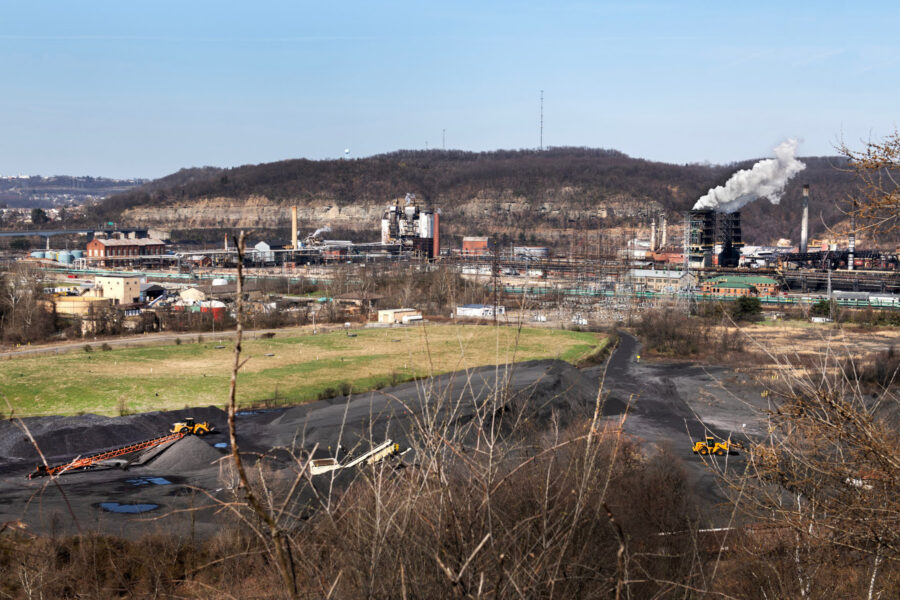In the communities most heavily impacted by the fossil fuel industry, a national movement pushing the Green New Deal is amplifying calls for government investment in climate jobs.
About 130 people rallied under a tent in Pittsburgh’s Schenley Plaza on Thursday afternoon, sheltering from rain on what Rep. Summer Lee (D-Pa.), a progressive elected last year, described as a “quintessential Pittsburgh day.” The rally was the fourth stop of a national tour led by the Green New Deal Network, a coalition working to promote government investment in local climate jobs and justice. Partnering with local organizations and lawmakers in communities on the frontlines of climate and environmental injustice, the coalition hopes to use tour stops to demonstrate rising demand for ramped up federal and state investment in green union jobs and social programming.
“The idea of the Green New Deal is that the only solution to climate change is the government spending money on it,” Saul Levin, legislative and political director at the Green New Deal Network, said.
Partner organizations included Food and Water Watch, the Sunrise Movement’s Pittsburgh hub, the Breathe Project—an advocacy organization focused on air quality in and around Pittsburgh—and Women for a Healthy Environment, another local nonprofit focused on environmental health education. Levin said that the crowd hung around for about an hour after the speeches and performances concluded, mingling and making plans for future actions.
The Green New Deal resolution, officially unveiled in 2019 by Rep. Alexandria Ocasio-Cortez (D-N.Y.) and Senator Ed Markey (D-Mass.) and reintroduced in 2023, is a framework for addressing the impacts of climate change through robust federal spending and a 10-year commitment to creating climate-related union jobs. Initially dismissed by establishment politicians from both parties, the Green New Deal rose rapidly in popularity among voters and its essential mission—to address climate change through a government investment in union jobs—became a key talking point in the 2020 Democratic presidential primary and central to subsequent federal climate actions, including the Biden administration’s Build Back Better Act. Originally a $3.5 trillion proposal, the Build Back Better Act eventually became the $369 billion Inflation Reduction Act.
Now, the Green New Deal Network, which commends the administration’s investments in climate action but says that they barely scratch the surface of the nation’s needs, is demanding a renewed commitment of the originally proposed funds, as well as an additional $1 trillion in climate, education, labor and social policy between now and 2030. With the “Green New Deal for the People” tour, the coalition hopes to reignite support for ramped up investment in climate jobs and demonstrate the pressing needs of working class communities of color living in climate and environmental risk zones.
The tour began in November and has stopped in Georgia, Michigan, Illinois and now Pennsylvania. At each tour stop, site-specific demands are driven by local partners. Levin said it’s remarkable how consistently existing local campaigns fit into the rhetoric of the Green New Deal.
“Organizers and neighbors know what they need,” Levin said. “And there’s not enough money being put in to make sure the pipes don’t have lead in them, to make sure that people can breathe outside, to make sure people can have energy efficiency in their homes.”
In Dearborn, Michigan, the coalition highlighted how majority Black neighborhoods in Flint have been without clean water since 2014. In Georgia, they spotlighted rate increases from the state’s utility, Georgia Power. In Chicago, they partnered with the teachers’ union to call for investment in school building retrofits for decarbonization and safer air quality.
On Thursday’s stop in Pittsburgh, the tour focused on intersections between climate investments and healthcare.
“In the richest nation on earth, no community should have lead in its water,” Lee said, standing behind a banner that read ‘Green New Deal Means Good Union Jobs.’
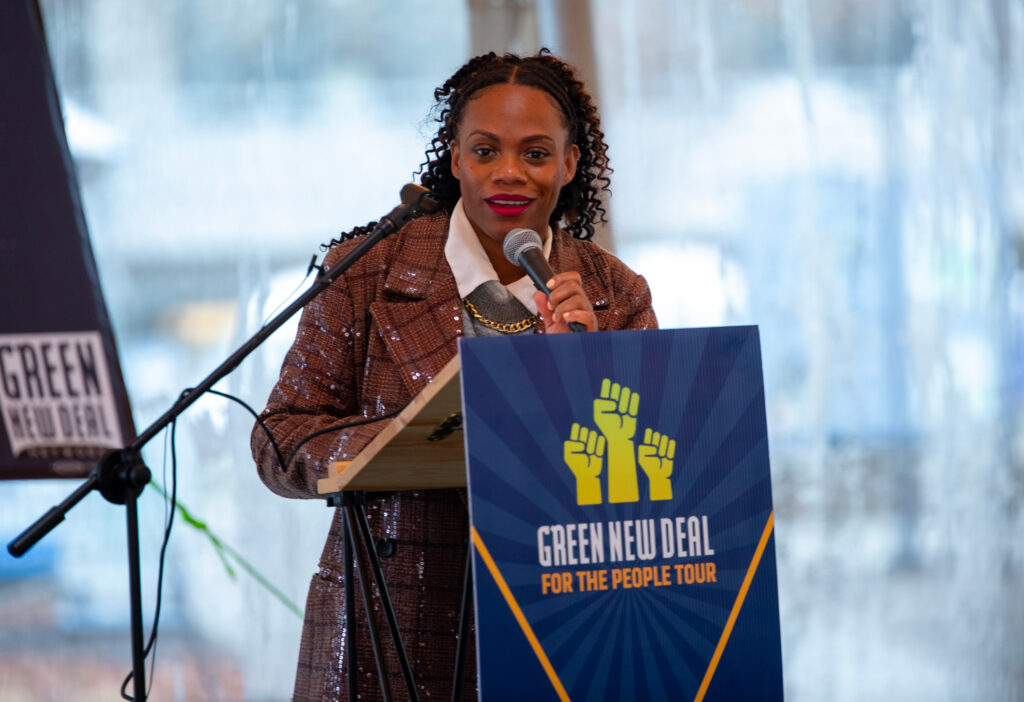
Lee, one of the leading Congressional advocates for the Green New Deal, said that when she was elected, many people didn’t honor lived experience as expertise. But Lee’s understanding of environmental racism and disinvestment from growing up near the Monongahela River in western Pennsylvania helps drive her passion for investment in clean union jobs, she said.
“I didn’t have the language to talk about the science behind climate or pollution,” Lee said. “But what I did have was, at that time, 29 years of growing up and living in the Mon Valley … [knowing that] if you are Black or you’re brown or you’re poor, wherever you are, you are more likely to live by that environmental hazard.”
Historically, the Pittsburgh metro area has been amongst the most polluted in the country, home to steel mills that fueled the industrial revolution and left a legacy of contamination in their wake. Although its pollution levels have been declining since the late ’90s, and in 2022, the area received its first passing grade from the American Lung Association for year-round and short-term particle pollution exposure, the ALA has continued to rank the Pittsburgh metro area amongst the 25 worst metro areas for particle pollution, retaining high counts of both particle pollutants and ozone smog.
In Pittsburgh—as throughout the country—pollution and its corresponding health impacts most acutely impact low-income populations and people of color. Allegheny County, which includes Pittsburgh, is in the top 1 percent of U.S. counties for cancer risk linked to toxic air emissions from stationary sources and has higher than average asthma rates, especially among Black residents.
In a speech at the rally, Natalia Rodriguez, a cardiac nurse and member of SEIU Healthcare Pennsylvania, said she sees the impacts of pollution and increased heat on her patients every day, including in increased numbers of heart attacks and severe cases of asthma.
Vanessa Lynch, the Pennsylvania Field Organizer of Moms Clean Air Force, a group focused on combatting air pollution and its impacts on children’s health, spoke about the impacts of local fossil fuel projects—historical and present day—on Pittsburgh residents. Lynch remembers her grandfather telling her stories about walking to work in the morning wearing a white shirt, and coming home in a gray shirt due to the industrial air pollution in the air.
“Big, bold investments to combat air pollution while creating clean energy union jobs, particularly in low-income communities, can be life saving,” Lynch said.
Other speakers at the rally included Allegheny County Executive Sara Innamorato, Grand Ynga Chief Pomaj-chakmam-yajalaji of the Okwehonwe Nation and the Sunrise Movement’s Ilyas Khan. Each touched on the health impacts of climate and environmental destruction in Pittsburgh and called for directed government investments.

A common thread between the speakers was that the region’s history of environmental justice issues makes it well-poised for a clean energy transition.
“If someone tells you that you can’t be for climate justice here in western Pennsylvania, we’re all here to tell them that they’re deadass wrong,” Lee said. “When we say that we can have good clean jobs, clean air and clean water, we are the blueprint here in Western Pennsylvania.”
The Green New Deal for the People tour will continue over the next few months, Levin said, with upcoming stops planned in Boston and Minneapolis. The demands include an emphasis on union jobs and a call for federal actions like the declaration of a climate emergency.
The tour comes amid ramped up calls from climate activists as the presidential election approaches for the Biden administration to take bolder action on climate issues or risk losing crucial votes. For Presidents Day last Monday, one of the Green New Deal’s biggest supporters, the Sunrise Movement, organized 40 actions across the country focused on their demand that President Biden declare a climate emergency.
Sunrise’s members—mostly teens and young adults—have said that Biden will lose votes that could cost him his reelection if he doesn’t take immediate actions, including declaring a climate emergency and calling for a permanent ceasefire in Gaza.
Earl Aguila, who organized an action in Burlington, Vermont, will turn 18 before the election, but said he doesn’t feel like voting this year.
“It’s just upsetting that I have to pick the lesser of two evils,” Aguila said. “Shouldn’t we have a better option? Especially young people, we’re going to have to bear the brunt of this crisis. We want someone who’s going to fight for us.”
Some of the members, like 16-year-old Ashton Dolce, are too young to vote. Dolce, who led an action by the Sunrise Movement in Phoenix, said his parents didn’t let him play outside before 5 p.m. during the summer as a kid, because the heat was so extreme.
This story is funded by readers like you.
Our nonprofit newsroom provides award-winning climate coverage free of charge and advertising. We rely on donations from readers like you to keep going. Please donate now to support our work.
Donate Now“It’s disheartening knowing that the young people being impacted by Biden’s decisions are the ones that don’t have a voice in government,” Dolce said. “We will absolutely put pressure on other ways, because even if I can’t vote, I will make sure that Biden declares a climate emergency and that his government actually starts to get their act together when it comes to climate change.”
The Green New Deal for the People tour shares some of these demands, but is highlighting state and local elections and legislative opportunities, as well as trying to influence federal elections and policy.
According to Lee, uplifting the Green New Deal framework will be a successful strategy in both local and federal elections.
“Pittsburgh led the country’s labor movement and Pittsburgh is leading this multi-racial, multi-generational movement to right the wrongs of environmental racism and demand clean air and water, worker power, union jobs, lower costs and a future where all of us can thrive,” Lee said. “If that’s not a blueprint for how we beat Republicans in November, I’m not sure what is.”
Correction: An earlier version of this story misstated Vanessa Lynch’s position with Moms Clean Air Force. She’s the Pennsylvania Field Organizer of the organization, not the Executive Director.







